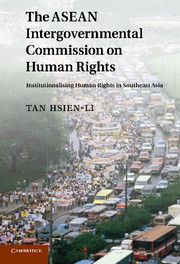 The ASEAN Intergovernmental Commission on Human Rights
The ASEAN Intergovernmental Commission on Human Rights Book contents
- Frontmatter
- Contents
- List of tables
- Preface
- 1 Charting the human rights institutionalisation process in Southeast Asia
- 2 Enough of ‘Asian values’: roots of the ASEAN states' reticence towards human rights
- 3 Self-determination and democracy: the human rights experiences of five ASEAN states
- 4 Instituting the regional rights regime: the ASEAN Intergovernmental Commission on Human Rights (AICHR) and the role of civil society
- 5 Human rights understanding between the ASEAN region and the United Nations: convergence, regional cohesion, and national responsibility
- 6 The unexplored aspect of human rights: what ASEAN needs to understand about the right to development
- 7 Sustaining AICHR's substantive empowerment: implementation, integration, and international law
- Bibliography and sources
- Index
2 - Enough of ‘Asian values’: roots of the ASEAN states' reticence towards human rights
Published online by Cambridge University Press: 07 September 2011
- Frontmatter
- Contents
- List of tables
- Preface
- 1 Charting the human rights institutionalisation process in Southeast Asia
- 2 Enough of ‘Asian values’: roots of the ASEAN states' reticence towards human rights
- 3 Self-determination and democracy: the human rights experiences of five ASEAN states
- 4 Instituting the regional rights regime: the ASEAN Intergovernmental Commission on Human Rights (AICHR) and the role of civil society
- 5 Human rights understanding between the ASEAN region and the United Nations: convergence, regional cohesion, and national responsibility
- 6 The unexplored aspect of human rights: what ASEAN needs to understand about the right to development
- 7 Sustaining AICHR's substantive empowerment: implementation, integration, and international law
- Bibliography and sources
- Index
Summary
Introduction
Almost every analysis of human rights referring to Asia invariably deals with the issue of ‘Asian values’. Southeast Asia is no exception. Vestiges of this longstanding misconception tend to persist in academic discussion despite the fact that justifications of ‘Asian values’ were quite thoroughly demolished with the onset of the financial meltdown of 1997. Given that a number of jurists such as Thio Li-ann and Randall Peerenboom have also clearly demonstrated the differences between genuine cultural concerns and knee-jerk defences during the ‘Asian values’ debate and that the political furore has died down thus allowing for genuine ‘rights and culture’ dialectic to get underway, there is no need to prolong discussion of the minutiae of ‘Asian values’ in Southeast Asia.
However, even if ‘Asian values’ are debunked, Southeast Asian states remain hesitant in participating in the international human rights system more comprehensively despite their accession or ratification of human rights treaties. They continue to insist on a fully consultative and gradual approach to developing the Association of Southeast Asian Nations (ASEAN) Intergovernmental Commission on Human Rights (AICHR). There must be other reasons, therefore, underlying this tentative adoption of international human rights standards. It is my aim to uncover the reasons behind this immutable posture so that suitable action may be taken to enhance the states' receptivity towards human rights.
Historical and geopolitical factors within the international order have indubitably contributed to the defensive and cautious attitude the ASEAN states display when faced with external pressures on human rights.
- Type
- Chapter
- Information
- The ASEAN Intergovernmental Commission on Human RightsInstitutionalising Human Rights in Southeast Asia, pp. 24 - 71Publisher: Cambridge University PressPrint publication year: 2011


